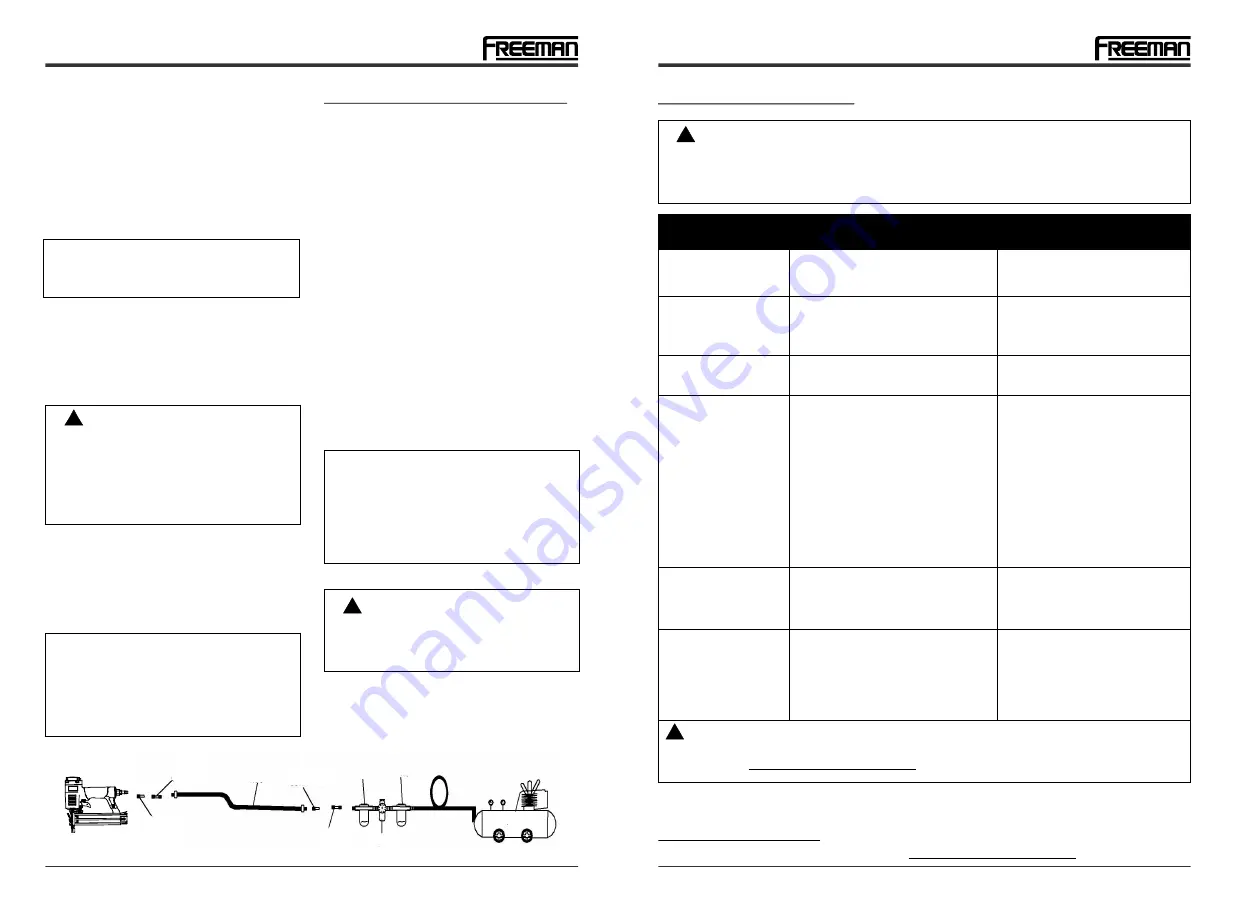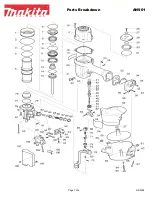
11
10
The tool is uniquely designed not to need daily
lubrication. But lubrication is required for best
performance after long periods of use. Oil for
pneumatic fastening tools is added through the air
line connection and will lubricate internal parts. Do
not use detergent oil or additives. These lubricants
will cause accelerated wear to the seals and
bumpers in the tool, resulting in poor tool
performance and frequent tool maintenance.
LUBRICATION
Do not at any time let brake fluids,
gasoline, petroleum-based products,
penetration oils, ect., come in contact
with plastic parts. Chemicals can damage,
weaken or destroy plastic which may
result in serious personal injury.
WARNING:
!
Do not store tools in a cold weather
environment to prevent frost or ice
formation on the tool's operating valves
and mechanisms that could cause tool
failure.
CAUTION:
COLD WEATHER OPERATION
For cold weather operation, near and below
freezing, the moisture in the air line may freeze and
prevent tool operation. We recommend the use of
air tool lubricant or permanent antifreeze (ethylene
glycol) as a cold weather lubricant.
Lubricate tool only with specified
lubricants.
CAUTION:
Avoid using solvents when cleaning plastic parts.
Most plastics are susceptible to damage from
various types of commercial solvents and maybe
damaged by their use. Use clean cloths to remove
dirt, dust, oil, grease, etc.
CLEANING
RECOMMENDED HOOKUP
The air compressor must be able to
maintain a minimum of 60 psi when the
tool is being used. An inadequate air
supply can cause a loss of power and
inconsistent driving.
CAUTION:
Do not connect with an air compressor
which can potentially exceed 200 psi. As
tool may burst, possibly causing injury.
WARNING:
!
⒈
⒉
⒊
⒋
TROUBLESHOOTING
Stop using tool immediately if any of the following problems occur. Serious personal injury
could result. Any repairs or replacements must be done by a qualified service person or an
authorized service center.
WARNING:
!
Air leaking at trigger
valve area.
O-rings in trigger valve housing are
damaged
Replace o-rings. Check operation
of Work Contact Element(WCE)
Air leaking between
housing And nose.
Loose screws in housing
1.Damaged O-rings
2.Damaged to bumper
Tighten screws
1.Replace o-rings
2.Replace bumper
Air leaking between
housing and Cap.
1.Loose screws
2.Damaged gasket
1.Tighten screws
2.Replace gasket
1.Replace bumper
2.Clean drive channel
3.Clean magazine
4.Replace spring
5.Check fitting, hose, or compressor
6.Replace and lubricate o-rings
7.Replace o-rings
8.Tighten screws and fittings
9.Replace gasket
1.Worn bumper
2.Dirt in nose piece
3.Dirt or damage prevent fasteners or
pusher from moving freely in
magazine
4.Damaged pusher spring
5.Inadequate air flow to tool
6.Worn O-ring on piston or lack
of lubrication
7.Damaged O-ring on trigger valve
8.Air leaks
9.Cap seal leaking
Tool skips driving
fastener
PROBLEMS
POSSIBLE CAUSE(S)
CORRECTIVE ACTION
1.Lubricate nailer
2.Replace spring
3.Replace damaged internal parts
1.Tool not lubricated sufficiently
2.Broken spring in cylinder cap
3.Exhaust port in cap is blocked
Tool runs slow or has
loss of power
1.Replace guide
2.Use only recommended fasteners
3.Replace with undamaged fasteners
4.Tighten screws
5.Replace driver
1.Guide on driver is worn
2.Fasteners are not correct size
3.Fasteners are bent
4.Magazine or nose screws are loose
5.Driver is damaged
Fasteners are jammed
in tool
HTTP://WWW FREEMANTOOLS COM 1-888-669-5672
.
.
HTTP://WWW FREEMANTOOLS COM 1-888-669-5672
.
.
MODEL: PBR32Q
MODEL: PBR32Q
Use only Freeman Authorized Repair Parts. For questions please call 1-888-669-5672 or visit
our website at http://www.freemantools.com
WARNING:
!
WEARING PARTS
Repair parts can be ordered from our website: http://www.freemantools.com
The air compressor must be able to maintain a
minimum of 60 psi when the tool is being used.
An inadequate air supply can cause a loss of
power and inconsistent driving.
An oiler can be used to provide oil circulation
through the tool. A filter can be used to remove
liquid and solid impurities which can rust or gum
up internal parts of the tool.
Always use air supply hoses with a minimum
working pressure rating equal to or greater than
the pressure from the power source if a
regulator fails, or 150 psi, whichever is greater.
Use 3/8" air hose for runs up to 50'. Use 1/2" air
hoses for 50' run or longer. For better
performance, install a 3/8" quick plug(1/4" NPT
thread) with an inside diameter of 0.315" (8mm)
on the tool and 3/8" quick coupler on the air
hose.
Use a pressure regulator on the compressor,
with an operating pressure of 0-125 psi. A
pressure regulator is required to control the
operating pressure of the tool between 60 psi
and 100 psi.
Quick
connector
Quick
Coupler
Air hose
Quick
connector
Oiler
Regulator
Filter
Compressor
Quick
Coupler




































